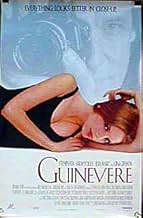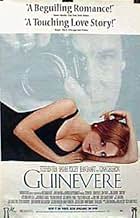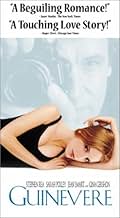NOTE IMDb
5,9/10
2,8 k
MA NOTE
Une jeune fille issue d'une famille aisée se rebelle et se lie avec un photographe beaucoup plus âgé qu'elle.Une jeune fille issue d'une famille aisée se rebelle et se lie avec un photographe beaucoup plus âgé qu'elle.Une jeune fille issue d'une famille aisée se rebelle et se lie avec un photographe beaucoup plus âgé qu'elle.
- Réalisation
- Scénario
- Casting principal
- Récompenses
- 2 victoires et 7 nominations au total
Sharon McNight
- Leslie
- (as Sharon Mcnight)
Avis à la une
Guinevere: Harper Sloane (Sarah Pollack) is a painfully shy young woman trapped in a household of lawyers lorded over by an alpha-mother (Jean Smart) who treats her like a servant. Destined to attend Harvard law school and join the pack, Harper finds her salvation in Connor Fitzgerald (Steven Rea), part-time photographer/philosopher, full-time con-man Svengali. Connor actually listens to what she says and offers her escape into an exciting bohemian lifestyle. Will he be her salvation or downfall? There are shades of Leaving Las Vegas in this film - it is dark and at times unpleasant - one scene in particular made me so uncomfortable I turned away from the screen. To its credit, Guinevere, like Leaving Las Vegas, is also a very good film. Sarah Pollack is outstanding as the withdrawn Harper (in stark contrast to her brazen, street-wise savvy Ronna in Go!). Although she's actually twenty, she looks fifteen, which helps to convey a believable vulnerability and transformation.
Rea is truly manipulative as Connor, more pathetic than sinister, who preys on young women - you're never quite sure if you should loathe or pity him. Finally, Jean Smart does an excellent job as the hard-as-nails matriarch, miles away from her smarmy character on Designing Women.
Well worth the price of admission.
Rea is truly manipulative as Connor, more pathetic than sinister, who preys on young women - you're never quite sure if you should loathe or pity him. Finally, Jean Smart does an excellent job as the hard-as-nails matriarch, miles away from her smarmy character on Designing Women.
Well worth the price of admission.
A young woman living in San Francisco, who has just been accepted to Harvard, decides upon another path after meeting and falling under the influence of an older man, an artist, in `Guinevere,' written and directed by Audrey Wells. Sarah Polley stars as Harper Sloane, who lives with her career oriented, rather self-absorbed family-- her parents, Alan (Francis Guinan) and Deborah (Jean Smart), and her older sister, Susan (Emily Procter). Rather self-conscious and unsure of herself, Harper has allowed her parents to plan her future-- a career in law, though it is decidedly against her own wishes. Then at Susan's wedding she meets the photographer, Connie Fitzpatrick (Stephen Rea), an artist, who quickly gains her confidence and lures her into his own bohemian lifestyle. She moves in with him (unbeknownst to her parents, who think she's staying with a friend for awhile), and he becomes her mentor; she is his `Guinevere,' and the only demands he makes of her is that she `create' something every day. The choice of her artistic endeavors is entirely up to her; photography, painting, writing, dancing. but she must create.
Inevitably, of course, their relationship develops beyond the mentor/protege stage, and she learns some things about him that ultimately lead to complications. And she discovers that her reign as Queen Guinevere may not be all that she had expected it to be.
Wells convincingly presents the allurement of a lifestyle free of constraints and overwhelming demands, which makes it quite understandable that the indecisive Harper would choose to go with Connie, rather than adhere to the wishes of her parents, who are rather cold and impersonal and altogether controlling (especially her mother). The fact that Alan dotes on Susan and could seemingly care less about Harper, as well as Deborah's apparent lack of actual concern for Harper, qualifies the facility with which Harper is able to effect her plans so readily. And even when Deborah finds out what Harper is up to (which, of course, was inevitable), she seems to take it as a personal affront more than anything, and is content with merely denigrating the relationship into which her daughter has entered, rather than even trying to change it, which ostensibly at least, would be the appropriate reaction of a concerned parent.
Polley is well cast as Harper, as physically and emotionally she is able to fit Harper's profile perfectly, and she gives a credible performance, though given her unassuming manner and fairly nondescript appearance, it says more about Connie than it does about her. And what you have already been able to deduce about Connie from his pursuit of Harper is further underscored during a scene in which Deborah confronts him with her views on the situation (which is arguably the most powerful scene in the film).
Rea is perfectly cast, as well, affecting a patient, reserved manner, touched with an almost forlorn weariness evocative of a certain wisdom-of-the-world attitude that makes Harper's attraction to him believable. And as the story unfolds, he very subtly allows you to see more of what lies beneath the surface until, in the end, you have a concise picture of who Connie really is. It's a fine, understated performance, and a good bit of work by Rea.
In a supporting role that demands mention, Jean Smart gives a smoldering performance as Deborah, a woman of seemingly insatiable needs and an overwhelming desire to dominate. And Smart plays it perfectly, from the look in her eye to the telling way she carries herself, making the most of her limited screen time and making Deborah the most memorable character of the film.
The supporting cast includes Gina Gershon (Billie), Paul Dooley (Walter), Carrie Preston (Patty), Tracy Letts (Zack), Sharon McNight (Leslie), Sandra Oh (Cindy), Grace Una (April) and Jasmine Guy (Linda). Though not a film with which you can get too emotionally involved, `Guinevere' has it's moments and does manage to maintain interest. The characters are real enough, but they evoke a sense of ambivalence; these are not people you are necessarily going to like or dislike. In the final analysis, it's a good film, and worth seeing-- but with the possible exception of Smart's character, there is nothing especially memorable or compelling about it. I rate this one 6/10.
Inevitably, of course, their relationship develops beyond the mentor/protege stage, and she learns some things about him that ultimately lead to complications. And she discovers that her reign as Queen Guinevere may not be all that she had expected it to be.
Wells convincingly presents the allurement of a lifestyle free of constraints and overwhelming demands, which makes it quite understandable that the indecisive Harper would choose to go with Connie, rather than adhere to the wishes of her parents, who are rather cold and impersonal and altogether controlling (especially her mother). The fact that Alan dotes on Susan and could seemingly care less about Harper, as well as Deborah's apparent lack of actual concern for Harper, qualifies the facility with which Harper is able to effect her plans so readily. And even when Deborah finds out what Harper is up to (which, of course, was inevitable), she seems to take it as a personal affront more than anything, and is content with merely denigrating the relationship into which her daughter has entered, rather than even trying to change it, which ostensibly at least, would be the appropriate reaction of a concerned parent.
Polley is well cast as Harper, as physically and emotionally she is able to fit Harper's profile perfectly, and she gives a credible performance, though given her unassuming manner and fairly nondescript appearance, it says more about Connie than it does about her. And what you have already been able to deduce about Connie from his pursuit of Harper is further underscored during a scene in which Deborah confronts him with her views on the situation (which is arguably the most powerful scene in the film).
Rea is perfectly cast, as well, affecting a patient, reserved manner, touched with an almost forlorn weariness evocative of a certain wisdom-of-the-world attitude that makes Harper's attraction to him believable. And as the story unfolds, he very subtly allows you to see more of what lies beneath the surface until, in the end, you have a concise picture of who Connie really is. It's a fine, understated performance, and a good bit of work by Rea.
In a supporting role that demands mention, Jean Smart gives a smoldering performance as Deborah, a woman of seemingly insatiable needs and an overwhelming desire to dominate. And Smart plays it perfectly, from the look in her eye to the telling way she carries herself, making the most of her limited screen time and making Deborah the most memorable character of the film.
The supporting cast includes Gina Gershon (Billie), Paul Dooley (Walter), Carrie Preston (Patty), Tracy Letts (Zack), Sharon McNight (Leslie), Sandra Oh (Cindy), Grace Una (April) and Jasmine Guy (Linda). Though not a film with which you can get too emotionally involved, `Guinevere' has it's moments and does manage to maintain interest. The characters are real enough, but they evoke a sense of ambivalence; these are not people you are necessarily going to like or dislike. In the final analysis, it's a good film, and worth seeing-- but with the possible exception of Smart's character, there is nothing especially memorable or compelling about it. I rate this one 6/10.
The young Canadian actress Sarah Polley can sizzle in character parts--she burns a hole in the screen in her tiny bit in Cronenberg's EXISTENZ, and she was luminous as the princess in the wheelchair in THE SWEET HEREAFTER. But in leading roles, she seems both brittle and amoeboid. As Harper, the insecure and overlooked daughter of a family of cutthroat lawyers, she has one amazing scene--being seduced, her reactions fry out her speakers, sending from giggly hysteria to overdrive lust. Harper is seduced by an aging bohemian wedding photographer (Stephen Rea)--a lush who talks a big game, pontificates in bars with his low-rent cronies, and makes a sport and a pastime of mentoring (and groping) avid young women. But we don't see any hunger, any passion or obsession in Harper. When the photographer, Connie, tells her she has talent it's an obvious pick-up line--not because she hasn't done any work, but because she shows no interest in anything but being noticed.
The writer-director, Audrey Wells, doesn't show much interest in anything else, either. The author of the scripts for GEORGE OF THE JUNGLE and INSPECTOR GADGET, her first indie feature has more than a whiff of the dilettante. Like AMERICAN BEAUTY, GUINEVERE likes to flirt with the idea of having an "edge," then shies away from it. Both of these movies are just too damned clear. The pleasure of that seduction scene is that Harper responds in ways that are messy, funny, unprogrammed; every other scene in the picture makes its point in letters so bold the thickest member of the audience couldn't miss it.
You can take the girl out of the studio, but ain't no way you're taking the studio out of the girl. The lechy photographer's big sin--the thing that makes him evanesce in Harper's eyes--is that, at fifty, he's still stumping and hustling for cash. Can Audrey Wells really intend that it's okay for Connie to be a serial phony, an ego-inflating come-on artist, but his real Achilles' heel is that he never made real money? (Wells' point seems to be: Connie gets Harper's tender young flesh--he could at least pay the bills.) Every scene is so blandly overdetermined it reeks of falsity--especially the much-applauded one where Harper's bitchy mom (Jean Smart) comes into Connie's loft and undoes their relationship with a single cutting observation. (Would these lovers react with such shock to such an obvious accusation?)
For someone making a movie about the romance of the artist's life, Wells seems to have no clue how artists talk to each other, or even behave--she seems to think that's egghead stuff the audience won't care about. But it's that, not sex, that's supposed to be the fundament of Connie and Harper's relationship. Despite Rea's and Polley's efforts, the movie drowns in big-movie timidity. And the ending--a Felliniesque princess fantasy where all of Connie's sweet young things gather for an All That Jazz adieu--maybe intended to be tender. It comes across as a final, passive-aggressive flipping of the bird to a half-forgotten, dirty-minded teacher.
The writer-director, Audrey Wells, doesn't show much interest in anything else, either. The author of the scripts for GEORGE OF THE JUNGLE and INSPECTOR GADGET, her first indie feature has more than a whiff of the dilettante. Like AMERICAN BEAUTY, GUINEVERE likes to flirt with the idea of having an "edge," then shies away from it. Both of these movies are just too damned clear. The pleasure of that seduction scene is that Harper responds in ways that are messy, funny, unprogrammed; every other scene in the picture makes its point in letters so bold the thickest member of the audience couldn't miss it.
You can take the girl out of the studio, but ain't no way you're taking the studio out of the girl. The lechy photographer's big sin--the thing that makes him evanesce in Harper's eyes--is that, at fifty, he's still stumping and hustling for cash. Can Audrey Wells really intend that it's okay for Connie to be a serial phony, an ego-inflating come-on artist, but his real Achilles' heel is that he never made real money? (Wells' point seems to be: Connie gets Harper's tender young flesh--he could at least pay the bills.) Every scene is so blandly overdetermined it reeks of falsity--especially the much-applauded one where Harper's bitchy mom (Jean Smart) comes into Connie's loft and undoes their relationship with a single cutting observation. (Would these lovers react with such shock to such an obvious accusation?)
For someone making a movie about the romance of the artist's life, Wells seems to have no clue how artists talk to each other, or even behave--she seems to think that's egghead stuff the audience won't care about. But it's that, not sex, that's supposed to be the fundament of Connie and Harper's relationship. Despite Rea's and Polley's efforts, the movie drowns in big-movie timidity. And the ending--a Felliniesque princess fantasy where all of Connie's sweet young things gather for an All That Jazz adieu--maybe intended to be tender. It comes across as a final, passive-aggressive flipping of the bird to a half-forgotten, dirty-minded teacher.
I just saw of this film at the Montreal World Film Festival. Stephen Rea and Sarah Polley were in attendance. You could not ask for two better actors. Rea plays a 45-50ish photographer who seduces 20 yr. old Sarah Polley to give up her law school career and become an artist and his live-in- lover.
The director and writer, Audrey Wells, also directed and wrote The Truth About Cats and Dogs. I intensely disliked that film because it was implausible, not grounded in any reality, and because even the luminous Jeneane Garafalo couldn't save it. Audrey Wells also wrote Inspector Gadget; clearly, her writing leaves something to be desired. In this film she manages to put interesting situations (May-September romance / high vs. low class) forth but whenever they approach any hard edges here comes the soft humour or easy way outs or just plain ambiguously unrealized character motives. Polley's character would get to say one disturbing or strong thing, then have go on acting so obviously well below her & her character's intelligence.
I consistently thought scenes were misdirected and that the writing gave up on itself and fell into cliche, sapping it of any force it had. And with the potential force between these two great actors never realized it was a sad loss. This is no Lolita or Educating Rita. Consider even the ballyhooed scene were Jean Smart, in a good job, takes down Rea's character in front of her daughter (the 'awe' scene.) The camera focusses intently on Smart's malice. Think how much better that little diatribe would be if we were watching *Polley's* reaction while hearing the *mother's* words. That would be a real dislocation. Then we could see the full range of which Polley is absolutely capable.
Also, the soundtrack music was very synthetic and touchy-feely and it worked completely against the (potentially) creepy aspect of the film, until the white-light hogwash of the end. But if you liked all that white-light business in "Kissed" & if you could tolerate the preposterous situation of Cats & Dogs, then maybe you will like this film. As it was, I found it singularly unconvincing, the moreso as it went along.
ps. Sandra Oh is very funny with the two minutes of screen time she gets. Sandra Oh is always excellent. If you want to see a good Sarah Polley & Sandra Oh film, rent "Last Night". It's brilliant. For Stephen Rea, look forward to his next Neil Jordan film.
The director and writer, Audrey Wells, also directed and wrote The Truth About Cats and Dogs. I intensely disliked that film because it was implausible, not grounded in any reality, and because even the luminous Jeneane Garafalo couldn't save it. Audrey Wells also wrote Inspector Gadget; clearly, her writing leaves something to be desired. In this film she manages to put interesting situations (May-September romance / high vs. low class) forth but whenever they approach any hard edges here comes the soft humour or easy way outs or just plain ambiguously unrealized character motives. Polley's character would get to say one disturbing or strong thing, then have go on acting so obviously well below her & her character's intelligence.
I consistently thought scenes were misdirected and that the writing gave up on itself and fell into cliche, sapping it of any force it had. And with the potential force between these two great actors never realized it was a sad loss. This is no Lolita or Educating Rita. Consider even the ballyhooed scene were Jean Smart, in a good job, takes down Rea's character in front of her daughter (the 'awe' scene.) The camera focusses intently on Smart's malice. Think how much better that little diatribe would be if we were watching *Polley's* reaction while hearing the *mother's* words. That would be a real dislocation. Then we could see the full range of which Polley is absolutely capable.
Also, the soundtrack music was very synthetic and touchy-feely and it worked completely against the (potentially) creepy aspect of the film, until the white-light hogwash of the end. But if you liked all that white-light business in "Kissed" & if you could tolerate the preposterous situation of Cats & Dogs, then maybe you will like this film. As it was, I found it singularly unconvincing, the moreso as it went along.
ps. Sandra Oh is very funny with the two minutes of screen time she gets. Sandra Oh is always excellent. If you want to see a good Sarah Polley & Sandra Oh film, rent "Last Night". It's brilliant. For Stephen Rea, look forward to his next Neil Jordan film.
Thoughtfully written, well acted, provocatively true to life... this is a movie for the intelligent, mature audience, not a movie to appeal to the lowest common denominator. Those who are too lazy to think (or just unable to!) won't "get it" and will condemn it because it did not hand them an answer on a platter. Those who thought about the story rather than merely reacting and who dug into the emotions found level after level of story and enjoyed the irony of the fact that even the most intelligent among us frequently do something we may later view as stupid. Even so, those "stupid" things help shape who we are, and may be as important to the formation of who we are as the "correct" choices we also make.
Worth the ticket and worth buying it on DVD when available.
Worth the ticket and worth buying it on DVD when available.
Le saviez-vous
- AnecdotesDuring the non-union shoot in San Francisco, crew members struck and were joined by star Sarah Polley, who walked the picket line. Striking crew members report that they were quite touched by her action, which was more than a gesture, but rather a sincere belief in workers' rights. On her part, Polley called her union, the Screen Actors Guild, to tell them of her action, and the union representative told her they'd back her if she crossed the picket line. SAG assumed that she was calling to ask whether she could defy the strike and cross the picket line! A shocked and dismayed Polley stayed out with the strikers, and the strike ended after three days when their grievances were met. Subsequently, Polley has stated that she has been told that she lost several job offers due to this incident as producers don't want a union 'militant' despite the film industry being a craft industry dominated by the guild (union) system and she did what she felt was right.
- GaffesThe wet spots on Harper's shirt after taking a shower. They're inconsistent.
- Citations
Harper Sloane: You're obviously mistaking me for someone with potential.
- Bandes originalesCoquette
Music by Carmen Lombardo & Johnny Green
Lyrics by Gus Kahn
Performed by John Pizzarelli
Courtesy of The RCA Records Label of BMG Entertainment
Meilleurs choix
Connectez-vous pour évaluer et suivre la liste de favoris afin de recevoir des recommandations personnalisées
- How long is Guinevere?Alimenté par Alexa
Détails
Box-office
- Budget
- 2 600 000 $US (estimé)
- Montant brut aux États-Unis et au Canada
- 632 283 $US
- Week-end de sortie aux États-Unis et au Canada
- 54 145 $US
- 26 sept. 1999
- Montant brut mondial
- 635 680 $US
- Durée1 heure 44 minutes
- Couleur
- Mixage
- Rapport de forme
- 1.85 : 1
Contribuer à cette page
Suggérer une modification ou ajouter du contenu manquant

Lacune principale
By what name was Une histoire d'initiation - Guinevere (1999) officially released in India in English?
Répondre































